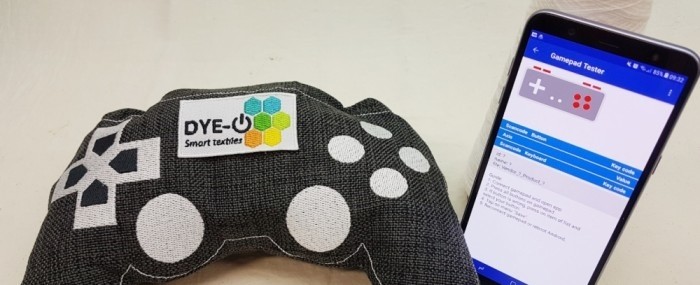
Startup uses nanotechnology to produce smart textiles
16 de abril de 2019By Suzel Tunes | FAPESP Innovative R&D – About four years ago Têxtil Águida, a family firm founded in 1983 in Santa Bárbara d’Oeste, São Paulo State, Brazil, decided to invest in a promising new field, the production of smart textiles, which is also known as e-textiles because they have built-in electronics and computational resources. In search of agility and autonomy in this new market segment, the family established a spinoff called AG Texteis in 2018.
By the end of the year, the spinoff had developed an electrically conductive fabric based on nanotechnology with the support of FAPESP’s Innovative Research in Small Business Program (PIPE). “We developed a nanodyeing process that converts synthetic and natural yarns and fibers into electrically conductive versions via special formulations of carbon nanotubes and silver nanowire,” says chemist Renata Cristiano Nome, principal investigator for the project, which was christened Dye-IO.
During the dyeing process, Nome explains, these nanomaterials with conductive properties are fixed into the fabric. “Conductivity testing shows this adhesion persists after washing, which is essential for practical applications,” she says.
For Nome, the main advantage of this process over current technologies for producing electroconductive textiles is that the end product is more flexible and comfortable when used in clothing. “Our direct competitors – in Europe and the United States since no one else is making e-textiles in Brazil right now – base their products on conventional chemical bath deposition of metals. The fabric is stiffer and less flexible as a result,” Nome says. Moreover, the conventional deposition process generates large amounts of potentially toxic waste, which is an environmental hazard and is electricity intensive.
The prototype developed during Phase 1 of PIPE, which ended in March 2019, was named Tex-Tok. “It’s touch sensitive, so a garment made with it can interact with a mobile device, such as a notebook, smart TV or smartphone,” Nome says.
Tex-Tok contains several electronic components, such as a microcontroller, a sensor, a Bluetooth module, and a battery. To demonstrate the practical applications of this e-textile, the firm used it in two interactive toys: a teddy bear and a gamepad (video game controller). Touching the surface of the teddy bear’s paws makes it talk or record the user’s voice. The gamepad is a cushion that interacts via Bluetooth with an Android phone.
Growing market
AG Texteis wants to enter a multibillion-dollar market. According to “E-Textiles 2017-2027: Technologies, Markets, Players”, a report produced by IDTechEx, a UK-based provider of market research, business intelligence and events featuring emerging technology, the e-textile market is set to reach US$5 billion in 2027.
This market encompasses fabrics with additional functionality, such as thermal control, bactericidal action, flameproof properties, and conductivity. The number of applications is practically unlimited. “Internet-connected sensors integrated with the fabric can be used for geolocation and to measure physiological parameters [heart rate, pH, blood sugar, etc.] that are important in the areas of health and high-performance sports. Countless areas can benefit from the development of e-textiles, but the defense and security sectors have the largest market share, currently corresponding to approximately 27% of the total,” Nome says. “We’re on the verge of a new revolution in which sensors and applications will migrate from smartphones to clothes.”
However, it may be some time before these products enter the Brazilian market, Nome warns. “Market analysts have told us the market is growing gradually and won’t be well established for another five years or so. This will enable startups like AG to position themselves competitively in the marketplace,” she says.
The firm’s entry into this new market was one of the most discussed topics when the researchers participated in the ninth edition of the PIPE High-Tech Entrepreneurship Training Program (PIPE Empreendedor) from October-December 2018. After many studies and interviews with prospective customers, the firm decided to start by developing products for the fashion and decoration segments.
AG Texteis plans to develop other products, such as a sofa arm cover that connects to a smart TV, dispensing with the need for a remote control.
Support from FAPESP’s PIPE program was not the only factor that helped this well-established textile manufacturer enter such an innovative market. Another factor was a partnership with the Renato Archer Information Technology Center (CTI), a research unit of Brazil’s Ministry for Science, Technology, Innovation and Communications located in Campinas, São Paulo State.
The two first made contact in 2015 when André Correa Marcilio, an executive of Têxtil Águida, and Renan Serrano, the designer and owner of the fashion label Trendt, went to CTI for assistance. There the two met Nome, who was then engaged in postdoctoral research at CTI, and chemist Fernando Ely, head of Research, Development & Innovation (RD&I) at CTI’s Electronic Packaging Laboratory.
“They came to us for help developing projects that integrated electronics [solar panels, sensors, displays, etc.] with textiles. The idea was to use the existing machinery at Têxtil Águida to make products with more value added and win new markets,” Ely recalls. “It’s part of CTI’s mission to support such initiatives, so we established an informal collaboration that resulted in our submitting a proposal to FAPESP’s PIPE program.”
Ely is now a consultant researcher, and the firm works with independent consultants in design, electrical engineering, chemistry and textile technology. “We’re hoping the project will now move forward to incubation [and later acceleration] at CTI-Tec [CTI’s incubator and accelerator unit], which is in the final stage of implementation,” Nome says.
Company: AG Texteis
Site: agtexteis.com.br
Address: Rua Professor José de Assis Saes n° 333, Distrito Industrial I, Santa Bárbara d’Oeste (SP) CEP: 13456-167
Tel: +55 19 3463-8333
Contact: contato@agtexteis.com.br
